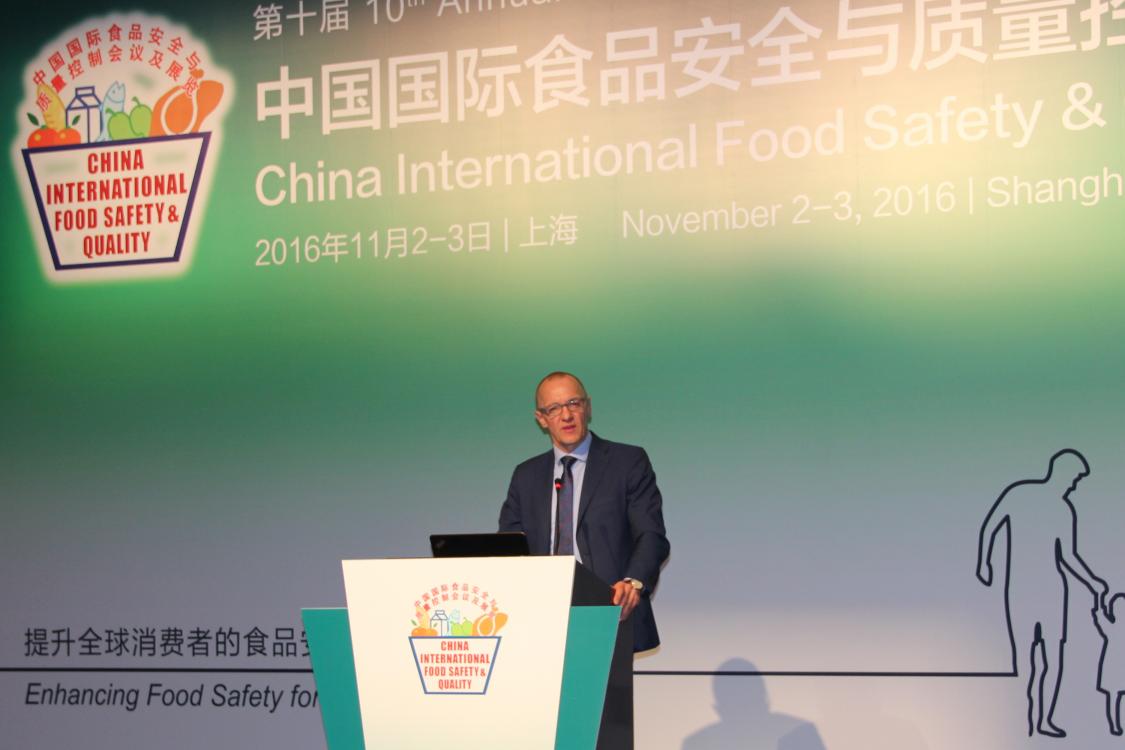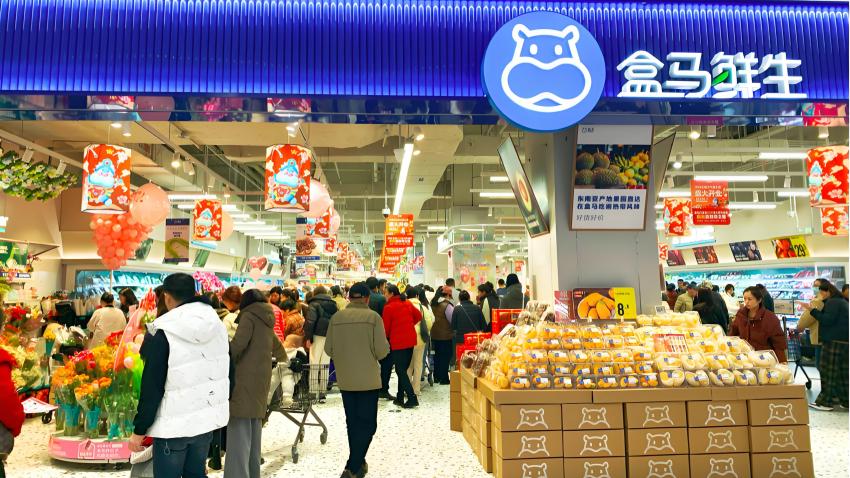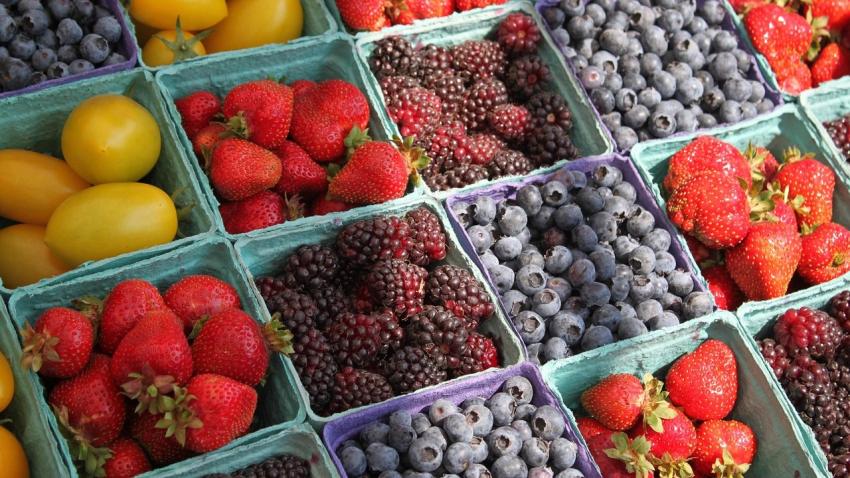You are here
Back to topChina and Europe Expand Cooperation in Food Safety

Bernhard Url shares the experience of EFSA at the China International Food Safety & Quality Conference & Expo 2016
Photo: Produce Report
European Food Safety Authority (EFSA) and the China National Centre for Food Safety Risk Assessment (CFSA) signed a Memorandum of Cooperation in Beijing on November 1st, 2016. On November 2nd and 3rd, EFSA also participated in the “China International Food Safety & Quality Conference & Expo 2016,” held in Shanghai. During the conference, EFSA’s executive director Bernhard Url spoke with Produce Report as to the advantages of having a “cemented” relationship with their Chinese counterpart, methods and strategies of promoting China’s fresh produce on the European market, and solutions to the problems faced by the country’s exporters due to rapid changes in international food safety regulation.
Produce Report: Yesterday, EFSA and the CFSA signed a Memorandum of Cooperation. What programs do you plan to start with? Are there any specific projects which are already under discussion?
Bernhard Url: I must note that the signing of the Memorandum is a continuation of our collaboration with the CFSA, which started in 2012. Through this Memorandum, we have formalized our cooperation, which allows us to exchange data, methodologies, and experts. We have agreed to start with short-term visits of Chinese experts to EFSA. One of our Chinese colleagues is already headed to our headquarters in Parma, where she will obtain training in the area of food packaging materials through the end of this year. Next year, however, we expect much more exchange to take place.
One of our high priority sectors of cooperation is risk communication in food safety. EFSA has extensive experience in effectively communicating risk related to food safety to risk managers, the media, and the public as a whole; we have developed many tools and channels in this field and are keen to share our knowledge with our Chinese colleagues. We invited the CFSA to join EFSA’s scientific cooperation projects (ESCO) group on risk communication, as well as the groups on risk assessment methodologies harmonization, chemical risk assessment, and microbiological risk assessment; the first two of these groups are under preparation, and the latter two already exist.
I always stress the three “ingredients” of risk assessment crucial to collaboration: data (we should be able to exchange data on chemical contaminants, food consumption, and other areas), methodologies (we should develop methods together, so that they are harmonized and can be used in any country), and experts. Exchange of experts is usually a big step forward in building trust between organizations and countries, but in my opinion, this is presently lacking and we would be wise to engage in deeper expert exchange.
Produce Report: On the other hand, what valuable practices can the CFSA share with EFSA?
Bernhard Url: China has a long history and tradition in science and excellent research is conducted here in China. We would like to learn Chinese approaches and techniques and apply this knowledge in tackling our own challenges.
Produce Report: How can Chinese-European collaboration in the area of food safety contribute to China’s fresh produce industry?
Bernhard Url: This is a big question. Just today, we discussed international standards for food producers. In order to comply with these standards, a country must have a well-designed food safety system, which sets up these standards and translates them into national law. This has been already done in China [when China’s new Food Safety Law entered into force in 2015]. Additionally, a country needs a sound risk assessment system. It is important to keep in mind that risk assessment does not refer to assessing products nor is it product certification, but it is predicting risk and working to prevent negative outcomes. As risk assessment continues to develop in China, national producers will find it less challenging to comply with international standards and farmers will gain a clearer understanding as to the importance of assessing and mitigating risk. In general, a greater emphasis on risk assessment will lead to further clarity in the system, which I think is both good and desirable for agro-industry.
Produce Report: Can improvements in China’s food safety laws and the development of its risk assessment system be viewed as a way to ease and increase the country’s fresh produce exports to Europe?
Bernhard Url: Yes, exactly. Producers will be able to meet international standards in a variety of categories, such as pesticides, heavy metals, and contaminants. This will increase their overall export capacity, not only to Europe but also globally as well.
Produce Report: As Europe’s food safety system continues to evolve, there are constant changes in EU regulations on fresh produce import. How do overseas exporters, including those from China, become informed about these changes? Many Chinese producers have to adjust their products to match EU import standards, so any lack of information or delay in its distribution could cause considerable losses.
Bernhard Url: EFSA does not set up standards and does not communicate changes, as it does not fall under our mandate. However, any and all amendments to European regulations are announced through official channels and can be found both on official websites and elsewhere on the Internet. My colleague Jérôme Lepeintre, the Minister Counsellor for Health & Food Safety of the Delegation of the European Union to China and Mongolia, can provide more information on this matter.
Jérôme Lepeintre: In order to ensure maximum transparency, there are always official publications made when changes are to be enacted. Moreover, after it is announced that standards are to be revised, a 60-day comment period is offered to the Chinese authorities so that they can comment and receive consultation on the forthcoming amendments. We do in fact inform AQSIQ about all regulatory changes, and we explain reasons, objectives, major operational impacts, and consequences of all changes.
Bernhard Url: Standards updates, such as any changes in MRL [Maximum Residue Limits], can be done without a large, formal announcement. Nonetheless, all updates are made available by the WTO on the basis of the “SPS agreement,” whose circulation is organized by the WTO Secretariat and can be tracked in the SPS Information Management System.















Add new comment